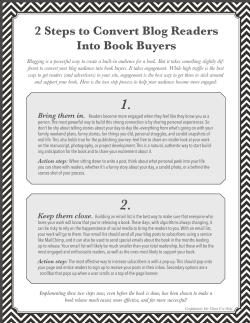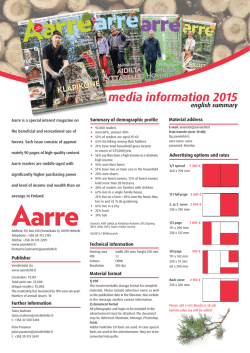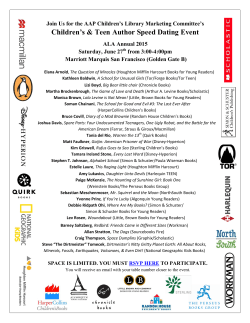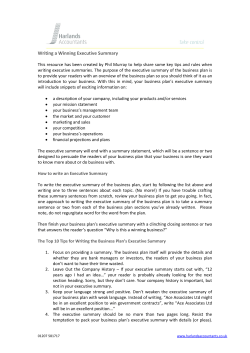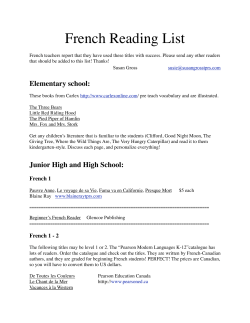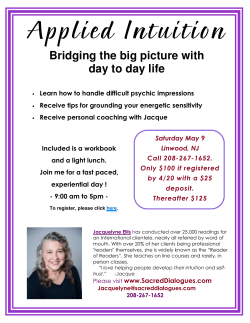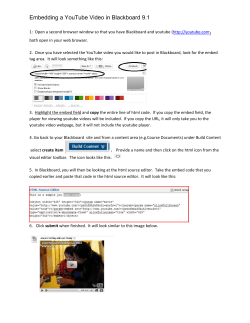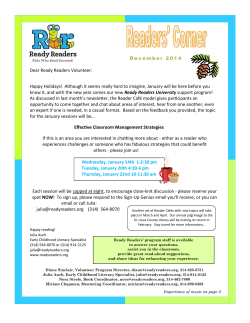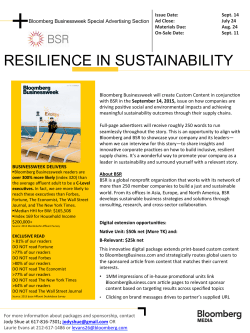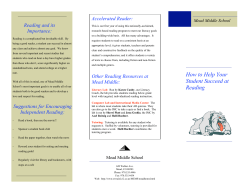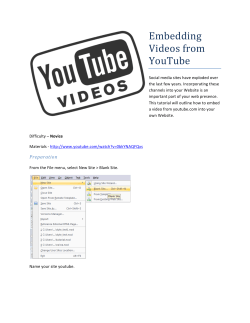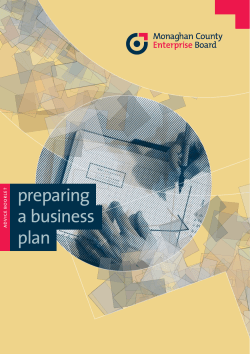
1 Grade English, Language Arts and Reading Curriculum Resources st
1st Grade English, Language Arts and Reading Curriculum Resources Rhyme – a word that ends with the same sound as another word Decoding – breaking written words into small units of sound in order to read the word Prediction – a conclusion about the future Alliteration – the repetition of the same sounds at the beginning of two or more adjacent words Fable – a fictional tale that teaches a moral lesson, is entertaining, and often includes animals that talk and act like humans Fantasy story – a story (that could include pictures or statements) that is not real or could not happen True story – a story (that could include pictures or statements) that is real or could actually happen Forms of media – advertisements (e.g., flyers/brochures/posters/signs), newspapers, magazines, radio programs, commercials, product labels Guide words – the first and last word defined on a page in a dictionary Plot – the basic sequence of events in a story‐ it includes the problem and solution Alliteration – the repetition of the same sounds at the beginning of two or more adjacent words or stressed syllables Expository text – a type of informational text that clarifies or explains something Text features – features in text to help locate information (e.g., title, table of contents, illustrations, photographs, bold text, italicized texts, charts, graphs) Procedural text – a type of informational text that is written with the intent to explain the steps in a procedure, as in a recipe Vowel digraph or vowel pair ‐ two vowels that together represent one phoneme or sound (e.g., ea, ai, oa) Media literacy – ability to use comprehension skills to analyze how words, images, graphics, and sounds work Digraphs – two successive letters that represent a single speech sound (e.g., th in thing, oo in moon, ou in out, and ow in how) Diphthongs – a combination of two vowel sounds in one syllable to form a new phoneme (e.g., /ow/ in howl, /ou/ in cloud, and /oi/ in boil) Source – document or person that supplies information about a topic or interest UNIT: 01 Exchanging Ideas and Messages http://www.abcya.com/alphabet.htm Alphabet sequencing game http://www.kidport.com/gradek/languagesarts/Workbook/LangK_LetterBlends.htm Online game to review letter blends http://www.enchantedlearning.com/consonantblends/ Worksheets and printables about letter blends. This site includes long lists of words that begin with blends. http://bogglesworldesl.com/dolch/lists.htm Dolch sight word lists can be found at this site. http://www.cookie.com/kids/games/sight‐words.html Link to a sight word memory game http://www.youtube.com/watch?v=Sy72OPgdVuA&feature=related School House Rock video about nouns http://www.teachervision.fen.com/skill‐builder/reading/48711.html Information about teaching emergent readers about making predictions before, during and after reading UNIT: 02 Readers Read for a Purpose http://www.studyzone.org/testprep/ela4/o/typesofsentencesl.cfm This site explains the four types of sentences. There is a link to a game students can play to practice the concept. http://www.harcourtschool.com/activity/clubhouse/index_pre.html A game to review types of sentences and the proper punctuation that goes with each of them. http://www.youtube.com/watch?v=f2NOav4Xx1c A video/song about action verbs http://www.enchantedlearning.com/rhymes/wordfamilies/ Information, word lists and printables with commonly used word endings http://www.readinga‐z.com/more/reading_strat.html/ Suggestions for helping emergent readers with word attack strategies and understanding text UNIT: 03 Developing Readers and Writers through Literary Works http://www.youtube.com/watch?v=zLn_VYodqa4&feature=related Video about the parts of a story (character, setting, beginning, middle and end) http://www.brainpopjr.com/writing/poetry/writingwiththesenses/grownups.weml Ideas for teaching kids about sensory details (figurative language) in reading and writing UNIT: 04 Developing Readers and Writers Using Informational Text http://www.scholastic.com/teachers/article/common‐questions‐about‐fluency Information about fluency and its importance in the reading process http://www.primaryresources.co.uk/online/alphaorder1.swf An online game to practice alphabetical order UNIT: 05A Media Mania http://www.youtube.com/watch?v=C93DPf1LWWw A video that explain how emergent readers make connections to the books they are reading and how parents and teachers can help with this process http://www.brainpop.com/english/writing/mainidea/ A short video explaining main idea. There are activities that follow the video to help check for understanding. http://www.authorstream.com/Presentation/ttravis‐57862‐Text‐Features‐Table‐Contents‐Index‐ Glossary‐Titles‐Subheadings‐Bold‐Color‐Education‐ppt‐powerpoint/ An informative PowerPoint that details features of a nonfiction text http://www.youtube.com/watch?v=Fo2cSioY6wI A video that teaches basic dictionary skills, to include guide words and alphabetical order. UNIT: 05B Research: Making a Plan http://big6.com/media/presentations/Super3_Dinos_Reid.pdf An early childhood research method explained UNIT: 06A All about Literacy http://www.ehow.com/list_6063240_activities‐diphthongs‐primary‐grades.html Suggestions on ways to teach diphthongs http://genresofliterature.com/ Description of the different types of literary genres http://www.learner.org/interactives/story/ Interactive site where students can listen to a story and then review story elements such as setting, characters, plot, etc… UNIT: 06B Making Connections http://www.harcourtschool.com/activity/book_buddy/rosie/skill_pre.html Online game to practice main idea. http://www.teachervision.fen.com/skill‐builder/reading‐comprehension/48783.html Information about helping students understand story elements http://www.readwritethink.org/classroom‐resources/student‐interactives/letter‐generator‐30005.html A ReadWriteThink lesson about writing a friendly letter http://www.abcya.com/friendly_letter_maker.htm An interactive site that allows students to write their own friendly letter
© Copyright 2025
